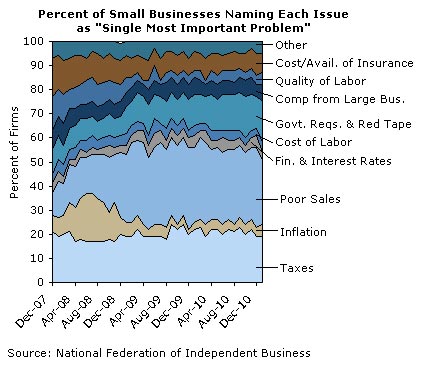
Article Artículo
Has Haiti’s Food Aid Been Shelved?CEPR / March 02, 2011
Article Artículo
Structural Unemployment: The Data Just Doesn't Match UpStructural unemployment – unemployment stemming from a mismatch of workers' skills and job requirements – has been cited in mainstream media as the main cause of current, high unemployment. Data from the National Federation of Independent Business (NFIB), however, suggest that structural unemployment is not what is ailing the economy. The graph below draws on data from the NFIB's monthly survey from December 2007 (the official start of the recession) to January 2011. Each month, the NFIB asks its sample of small businesses to state the single most important problem facing their business today. Since the recession began, respondents overwhelmingly have cited "poor sales," suggesting that today's unemployment is primarily due to a lack of demand. "Quality of labor," the factor most consistent with structural unemployment, barely made the list.

In fact, as the recession deepened, "poor sales" became increasingly important, while "quality of labor" was cited less and less often. Furthermore, through an analysis of the NFIB data, we looked at the indicators that had the largest increase since and decrease since 2007, and they ended up being "poor sales" and "quality of labor" respectively. These findings suggest that the current, high unemployment is indeed cyclical and not structural.
CEPR and / March 02, 2011
Article Artículo
Are Republicans Really Worried That The Economy Is Creating Too Many Jobs?Dean Baker / March 02, 2011
Article Artículo
The Washington Post Tell Readers That Obama Doesn't Have Fiscal Credibility (Yes, In Its News Sections)Dean Baker / March 02, 2011
Article Artículo
They are Just Trade Agreements, not "Free-Trade" AgreementsDean Baker / March 01, 2011
Article Artículo
Uninformed Appraisals Should Lead to Inaccurate Appraisals, Not Low AppraisalsDean Baker / March 01, 2011
Article Artículo
USA Today's Government/Private Pay GAP Could be Eliminated by Hiring More GroundskeepersDean Baker / March 01, 2011
Article Artículo
Going Sideways: The Battle Over Budget CutsDean Baker / February 28, 2011
Article Artículo
Right to Work: Representation Without TaxationDean Baker / February 28, 2011
Article Artículo
Mitch Daniels, Bush's OMB Director, Is Deluded About the Severity of the 2001 RecessionDean Baker / February 28, 2011
Article Artículo
Prosecuting Wall Street Fraud: Lessons for Joe NoceraDean Baker / February 28, 2011
Article Artículo
FactCheck Gets It Wrong on Social Security and the DeficitFactCheck.org, a project of the Annenburg Public Policy Center, wrongly attacked a number of prominent Democrats for correctly pointing out that Social Security does not contribute to the deficit. The people attacked included New York Senator Charles Schumer, Senate Majority Whip Richard Durbin, and President Obama’s Budget Director Jacob Lew.
This point should be pretty straightforward. Under the law, Social Security is financed by a designated tax, the 12.4 percent payroll that workers pay on their first $107,000 of income each year. The money raised through this tax is used to pay benefits. Any surplus is used to buy U.S. government bonds. All funding for the program comes either from this tax or from the bonds held by the program’s trust fund. (The Social Security system is also is credited with a portion of the income tax paid on Social Security benefits.)
CEPR / February 27, 2011
Article Artículo
Doesn't Anyone Have Anything Bad to Say About Jacob Lew?Dean Baker / February 26, 2011
Article Artículo
The Washington Post STILL Has Not Heard About the Housing BubbleDean Baker / February 26, 2011
Article Artículo
Labor Market Policy Research Reports, Feb. 12 – 25, 2011This is the fifth installment of a new weekly feature at the CEPR Blog. Every Friday, we'll post a list of labor market related policy research reports from progressive research centers around the country. This week, reports from Center for American Progress, Center on Budget and Policy Priorities, Center for Economic and Policy Research, Center for Law and Social Policy, Economic Policy Institute, Political Economic Research Institute, and UCLA Institute for Research on Labor and Employment.
CEPR and / February 25, 2011
Article Artículo
The Post Wants YOU to Lose Your Job to Ease Its Concern About InflationDean Baker / February 25, 2011